Related Research Articles

Politics in the Syrian Arab Republic takes place in the framework of a presidential republic with nominal multi-party representation in People's Council under the Ba'athist-dominated National Progressive Front. In practice, Syria is a one-party state where independent parties are outlawed; with a powerful secret police that cracks down on dissidents. Since the 1963 seizure of power by its Military Committee, the Arab Socialist Ba'ath Party has governed Syria as a totalitarian police state. After a period of intra-party strife, Hafez al-Assad gained control of the party following the 1970 coup d'état and his family has dominated the country's politics ever since.
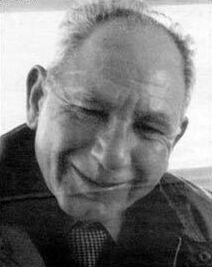
Riad al-Turk was a Syrian opposition leader, a political prisoner for about 20 years, and supporter of democracy, who was called "the Old Man of Syrian opposition." He was secretary general of the Syrian Communist Party from its foundation in 1973 until 2005.

The Muslim Brotherhood in Syria is a Syrian branch of the Sunni Islamist Muslim Brotherhood organization. Its objective is the transformation of Syria into an Islamic state governed by Sharia law through a gradual legal and political process.

The Syrian Democratic People's Party is a centre-left, democratic opposition party in Syria. It is a member of the Syrian opposition, a member of the National Democratic Rally, and a participant in the Damascus Declaration.
The Damascus Spring was a period of intense political and social debate in Syria which started after the death of President Hafiz al-Assad in June 2000 and continued to some degree until autumn 2001, when most of the activities associated with it were suppressed by the government. It started with the Statement of 99 and the establishing of the Committees of Civil Society, then the Statement of 1000 was issued carrying the signature of 1000 Syrian intellectuals in 2001.
The National Democratic Rally or National Democratic Gathering is a banned opposition alliance in Syria, comprising five political parties of a secularist, pan-Arabist, Arab nationalist and socialist bent.
Ali Sadreddine Al-Bayanouni is a Muslim Brotherhood leader in exile in London. He was born in 1938 in Aleppo and brought up in a religious family, where his father and grandfather were both well known Muslim scholars. He joined the Muslim Brotherhood while in secondary school, in 1954, and went on to graduate with a law degree from the University of Damascus in 1963. He served as a reserve officer in the Syrian Army from 1959 to 1960. Bayanouni became a member of the Syrian Muslim Brotherhood's Shura Council and Executive Office in 1972. Due to his membership in the Muslim Brotherhood, Bayanouni was imprisoned from 1975 to 1977. After his time in prison, he emerged to become the deputy leader of the Brotherhood in 1977. He left Syria two years later and eventually settled in Jordan, where he remained for twenty years. He arrived in Britain as a political refugee in 2000, after the Jordanian authorities requested he leaves the country.
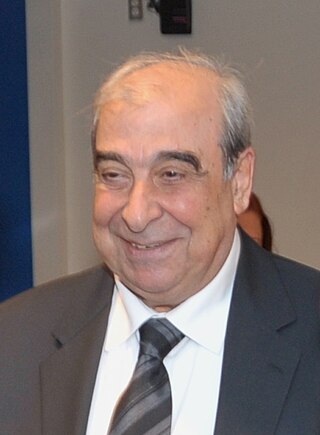
Michel Kilo was a Syrian Christian writer and human rights activist, who has been called "one of Syria's leading opposition thinkers."
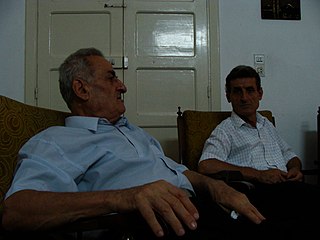
Aref Dalila is a Syrian economist and former Dean of the Faculty of Economics in Damascus University. He is currently working as a Senior Economic Researcher at Orient Research Center in the UAE. He was sentenced to ten years' imprisonment in 2002 on charges of "trying to corrupt the constitution, inciting armed rebellion and spreading false information" for his political activity during the Damascus Spring period, and imprisoned until released by presidential pardon in 2008.
The Faeq al-Mir arrest controversy refers to the arrest, imprisonment, and calls for release of Faeq al-Mir, leader of the Syrian People’s Democratic Party, after he telephoned Elias Atallah, a Lebanese politician critical of Syrian policies there. In the call, taped by Syrian Intelligence forces, al-Mir gave condolences to Atallah regarding the assassination of Pierre Gemayel, Lebanon's Minister of Industry. Al-Mir was detained by Syrian security forces at his home in Latakia on December 13, 2006, and charged in March 2007 with "undertaking acts that weaken national sentiment during times of conflict" and "communicating with a foreign country to incite it to initiate aggression against Syria or to provide it with the means to do so." On December 31, 2007, Damascus's First Criminal Court ruled him guilty of "circulating false or exaggerated news which would weaken the morale of the nation" and sentenced him to three years in prison, though the duration was immediately reduced to 18 months. Human rights groups, including Human Rights Watch and Amnesty International, criticized the arrest and demanded al-Mir's unconditional release.
Kamal al-Labwani is a Syrian doctor and artist, He was released from Adra Prison, near Damascus on November 15, 2011, according to state media. Before his release, Amnesty International called him a prisoner of conscience.
Riad Seif is a Syrian political dissident and prominent businessman who founded and led the Forum for National Dialogue. Seif was elected to the Parliament of Syria in 1994 as an independent and again in 1998. For several years he owned an Adidas franchise in Damascus.
The Damascus Declaration was a statement of unity by Syrian opposition figures issued in October 2005. It criticized the Syrian government of the Assad dynasty as "authoritarian, totalitarian and cliquish," and called for "peaceful, gradual," reform "founded on accord, and based on dialogue and recognition of the other."
Anwar al-Bunni is a Syrian human rights lawyer who has defended clients such as Riad al-Turk, Riad Seif, the owner of The Lamplighter,, Kurdish protesters, and "dozens of others."
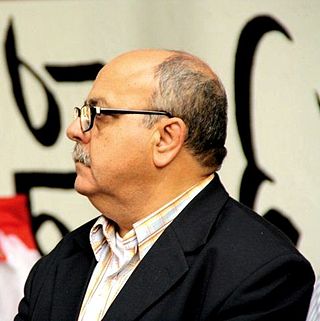
Abdulrazak Eid, Abdul razzak Eid, Abdul razaq Eid, Abdel razzak Eid, Abdul razzaq Eid, or Abd al Razzaq 'Id is a Syrian writer and thinker and one of Syria's leading reformers. He helped to found the Committees of Civil Society in Syria, drafted the Statement of 1000 and helped to draft the Damascus Declaration. Because of his opposition writings and political actions, he was arrested many times in Syria, banned from working and traveling, kidnapped by the Syrian intelligence forces, and was threatened with being assassinated. He fled Syria in 2008 for exile in Europe where he was elected president of the National Council of Damascus Declaration in exile.

The Syrian opposition is the political structure represented by the Syrian National Coalition and associated Syrian anti-Assad groups with certain territorial control as an alternative Syrian government.

The National Coalition of Syrian Revolution and Opposition Forces (Arabic: الائتلاف الوطني لقوى الثورة والمعارضة السورية), commonly named the Syrian National Coalition (SNC) (Arabic: الائتلاف الوطني السوري), or the Syrian National Revolutionary Coalition (SNRC) is a coalition of opposition groups in the Syrian civil war that was founded in Doha, Qatar, in November 2012. Former imam of the Umayyad Mosque in Damascus, Moaz al-Khatib, considered a moderate, was elected the president of the coalition, and resigned on 21 April 2013. Riad Seif and Suheir Atassi, both prominent democracy activists and the latter a secular human rights advocate, were elected vice presidents. The post of a third vice president will remain vacant for a Kurdish figure to be elected. Mustafa Sabbagh was elected as the coalition's secretary-general. The coalition has a council of 114 seats, though not all of them are filled.
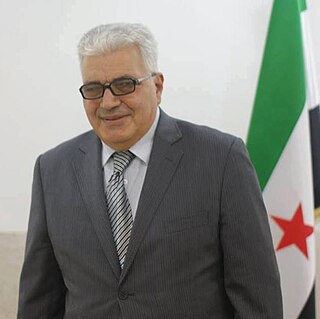
Mouaffaq Nyrabia is a Syrian dissident, politician, political writer and mechanical engineer, best known for his pivotal role in the creation of Damascus Declaration, a prominent Syrian Opposition structure until the Syrian Revolution erupted in March 2011. Since he left Syria, in early 2013, he has been an active member of the National Coalition for Syrian Revolutionary and Opposition Forces, a member of its executive board, representing the secular political current Muwatanah. Nyrabia worked on founding a democratic bloc inside the Syrian Coalition and joined the similar attempts led by dissident writer and politician Michael Kilo. In June 2014, the democratic bloc, which became a major force inside the coalition, voted Nyrabia to be its candidate to preside over the coalition, after Ahmad Jarba, who is a member of the same bloc. However, in March 2016, Nyrabia was elected as First Vice President of the coalition.

The history of Syria covers events which occurred on the territory of the present Syrian Arab Republic and events which occurred in the region of Syria. Throughout ancient times the territory of present Syrian Arab Republic was occupied and ruled by several empires, including the Sumerians, Mitanni, Assyrians, Babylonians, Egyptians, Hittites, Canaanites, Phoenicians, Arameans, Amorites, Persians, Greeks and Romans. Syria is considered to have emerged as an independent country for the first time on 24 October 1945, upon the signing of the United Nations Charter by the Syrian government, effectively ending France's mandate by the League of Nations to "render administrative advice and assistance to the population" of Syria, which came in effect in April 1946.
Abdul-Aziz al-Khair, born 1952 in the Latakia Governorate, is a Syrian intellectual and a prominent figure of the Communist opposition in Syria. He was reported missing in 2012.
References
- 1 2 3 4 No Room to Breathe, October 16, 2007
- 1 2 3 Wright, Robin, Dreams and Shadows, the Future of the Middle East, Penguin Press, 2008, p.224
- ↑ Wright, Dreams and Shadows, 2008, p.227
- ↑ Syria: Prisoner of conscience, Riad Seif Archived 2015-02-18 at the Wayback Machine